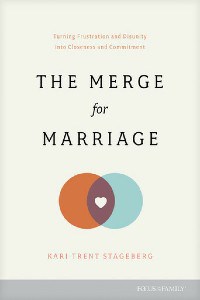Preview:
Woman #1: I suppose the most surprising thing about marriage for me was that it really did bug me that the toothpaste cap always came off.
Woman #2: The thing that surprised me the most about being married is that my husband stopped being a communicator once he had me.
Man #1: Well, I had no idea that there was a proper way to roll the toilet paper, that it goes a certain way. See, I thought it was just any way, but I found out quickly, no, it has to roll over the top.
Woman #3: What surprised me the most about marriage, and it hasn’t been that long, I got married in January, is that we didn’t know each other quite as well as we thought we did. You really, really get to know someone when you live with them. You pick up on, um, little quirks, and everyone has them, and you learn a lot about each other in a short amount of time.
End of Preview
John Fuller: Well, how about you? I wonder if there were unexpected discoveries about your spouse after the wedding? And, uh, how well did you navigate your different quirks of personality and behavior? We’re gonna cover that today on Focus on the Family, those inevitable differences and surprises that husbands and wives find in each other, and especially in those early years of marriage. Thanks for joining us. I’m John Fuller, and your host is Focus president and author, Jim Daly.
Jim Daly: I can remember, John, going into premarital counseling with Jean, and I, I guess the best way to describe it, a bit of blinders.
John: (laughs)
Jim: ‘Cause we thought we were so much alike. And we did, we had a great foundation in faith and commitment to the Lord, that was common. I think we had other commonalities, but, boy, then you get married, and (laughs) you do… What the folks were saying in that lead -in is so true, uh, not to mention the way to keep a garage clean-
John: Ah.
Jim: … is kinda my pet peeve.
John: (laughs)
Jim: Like, it’s not the, uh, you know, the throw all the boxes out there and find your way to your car kinda approach.
John: (laughs)
Jim: And I’m sure Jean would say, “Yeah, tell me about these laundry piles that you keep.” ‘Cause I keep, like, once used clothes, that’s a certain pile-
Kari: Yep.
Jim: … and, like, (laughs) I’m gonna use them again.
John: Well, remember to wash that.
Jim: And then there’s the super dirty, gotta get those into the wash and, you know.
John: (laughs)
Kari: (laughs)
Jim: So, I mean, she’s like, “I don’t understand your system.” (laughs)
Kari: (laughs)
Jim: And so this is part of what we’re gonna talk about today, and I think-
John: Mm-hmm.
Jim: … most people can, uh, relate to that.
John: Yeah.
Jim: And our guests today are really gonna hit it. And here’s what I think, uh, God put our differences into marriage on purpose.
John: Mm.
Jim: And we talk about that with some people that really think every day about it, like Gary Thomas and Gary Chapman and others who, uh, really have studied marriage. And I think the best line is that we’re not alike so that we can become selfless in our marriage and become more like Christ-
Joey: That’s good.
Kari: Yeah.
Jim: … in that process. And when we can focus on that, I think it, uh, puts the arguments down somewhat.
John: Yeah, I’d have to agree with you. And, uh, Joey and Kari Stageberg are our guests, and, uh, they’re gonna shine some light on this. Kari’s been on the program before with her dad, Dr. John Trent, and she writes and speaks and coaches people toward healthier connections at home. Uh, Joey’s a first time guest and works as a video producer at Life Center Church in Washington State. And, uh, we’re gonna explore a book that Kari has written, uh, called The Merge for Marriage: Turning Frustration and Disunity Into Closeness and Commitment. And you can learn more at our website, that’s focusonthefamily.com/broadcast.
Jim: Kari and Joey, welcome.
Kari Stageberg: Thank you. We’re excited to be here.
Joey Stageberg: Yeah, thanks. Thanks. Thanks for having us.
Jim: Yeah, it’s good to have you. And, uh, let’s get started. I understand, uh, you both experienced a crisis early in your marriage. Uh, it had something to do with the kitchen sink. (laughter) Well, that’s good, I thought it was gonna say kitchen knife.
Joey: Oh. (laughter) That would be a crisis.
Kari: What would be a very different crisis. Yeah.
Jim: So it’s good it was the kitchen sink. (laughter) But what, what in the world happened with your sink?
Kari: Yeah. (laughter) You know, it, we had been married all of about three weeks, so we were in that really fun, newlywed fresh back from the honeymoon phase. Life is really good, and I remember coming home and couldn’t find Joey so I called out and all of a sudden this head pops around the corner and I’m blinded by this light. And I realize, okay, uh, wait a second, my husband’s wearing a headlamp.
Jim: (laughs)
Kari: And so I’m like, well, what are you, what you doing? And he’s like, “Cleaning.” Like it was the most normal thing in the world. And so in my mind I’m like, all right, did a dog get sick? Is there like crime scene at-
Jim: (laughs)
Kari: Like, where are we on the, like we need a headlamp for this?
Joey: Yeah.
Kari: And-
Jim: That’s pretty interesting. Let’s just stop and camp on this for a minute.
Kari: Yeah. (laughs)
Jim: Joey. (laughter) Joey, what were you thinking, man?
Joey: Oh.
Jim: The headlamp on the sink.
Joey: What was it? It was, it wasn’t the sink on top, it was underneath, right? So, you know-
Kari: But why are you even cleaning under the sink?
Joey: It was a little dark, and so, well-
Jim: (laughs)
Kari: I think that’s an even bigger question.
Joey: Well, well, it was under sink.
Jim: I think there’s an unresolved conflict here.
Joey: (laughs)
Jim: Did you take out a toothbrush?
Joey: Um, there may have been a toothbrush.
Jim: (laughs)
Joey: And m-, there may have been some other brushes as well, yeah.
Jim: Okay, good. So what were you communicating? Kari, how did it make you feel to know that, oh my, this guy-
Kari: Well, that was, that was the moment-
Jim: … is a clean freak.
Kari: … when I realized I, I had no idea who I had married.
Jim: (laughs)
Kari: ‘Cause I, I, I mean, we had like just cleaned the house, so to me I was like, it looks pretty clean, and also under the sink, like who does that? You just pretend it’s not there, right?
Jim: (laughs)
Kari: And, but, I, really for me, I started to panic because I was like, is Joey going to now have these expectations of me-
Jim: Hm.
Kari: … because that’s not how I operate.
Jim: Yeah. No, that’s good, and that, boy, that can be the first big conflict.
Kari: Yep.
Jim: That off the honeymoon, like you said.
Kari: Yeah.
Jim: So what is that merge moment that you talk about in the book, Merge Marriage?
Kari: Yeah. Well, and I think really what it is is it’s, it’s a moment like that. And whether, you know, for me it was that single moment where it was, oh my gosh, uh, he’s living in my house, he’s not going anywhere-
Jim: (laughs)
Kari: … and we’re gonna have to figure out how, w- what clean means for us. Um, or whether it’s like Joey, where it’s a series of moments that merges those moments where you realize, oh my gosh, we are really different. And we have a choice-
Jim: But it’s good that you recognized that.
Kari: Yep, but we have a choice now. We can either choose to blend these differences and get closer together and have more intimacy in our marriage, or these can drive us apart.
Jim: I, I would think in most cases you get stuck maybe for a few weeks, few months, and for some a few years-
Joey: Mm-hmm.
Jim: … in this division.
Kari: Absolutely.
Jim: And you don’t really talk about it, it’s just painful, but it’s quiet and you just go about doing what you have to do. What was your aha moment, Joey, knowing that Kari, uh, needed some encouragement through this struggle?
Joey: Yeah. Well, I mean, Kari would, we’d tend to talk about these things from, from time to time that’d come up and Kari would feel a certain way. And she would tend to, you know, backtrack a little bit or-
Kari: Or mildly overreact.
Joey: Mildly overreact.
Kari: Or massively overreact.
Jim: I like that description.
Joey: Yeah.
Kari: (laughs) Yes.
Joey: I mean, that was really- but projected.
Jim: Mildly overreact.
Kari: (laughs)
Joey: Um, and, you know, she almost, it almost to, to a degree of, uh, she thought that, you know, I was leaving, or, or that we were gonna end, or there was, we were on the way out.
Jim: Or this could push you out the door.
Kari: Yeah.
Joey: Exactly.
Jim: Yeah.
Joey: But, so just remind her, you know, Kar Bear, I’m not going anywhere.
Jim: Kar Bear.
Kari: Yeah.
Joey: These-
Jim: Aw.
Joey: These are issues, sure, they’re gonna arise, but I’m, it’s not pushing me away. Like-
Kari: Yeah.
Joey: Your reactions aren’t gonna like drive me somewhere and drive me out. Um, you know, I’m, I’m here. I’m, I’m with you.
Kari: Yeah. And I-
Jim: How that make you feel?
Kari: Well, I mean, that was what I needed.
Jim: Huh.
Kari: And I didn’t even know I needed that. And I think so often we see this where there’s the issue, right? And we get so caught up in managing issues, but there’s often something deeper behind those issues and behind those reactions.
Jim: I would say always.
Kari: And, you know, like for example, you know, it’s always the dishwasher for us. I swear, that’s like the catalyst. If someone could figure out like a self-loading-
Joey: Dishwasher.
Kari: … and unloading dishwasher, it would probably help a lot of marriages.
Jim: It’s called a robot. (laughs)
Kari: But, um, we, you know, he would say something super benign like, “Can you, did you unload the dishwasher?” And what I was hearing was not, “Did you unload the dishwasher?” But, “You have failed, and because of that failure, I don’t wanna, I’m not gonna want anything to do with you.”
Jim: Yeah.
Kari: And so when Joey paused and-
Joey: You overreacted.
Kari: … kinda looked at me and said, “Kari, I’m not going anywhere. These are just issues.” It gave me permission to not have to respond that way. ‘Cause our relationship wasn’t on the line, it really was-
Joey: Right.
Kari: … the dishwasher, not our relationship that we were talking about.
Jim: So let, let me ask you this, uh, ’cause Jean’s similar in that, you know.
Kari: Yeah.
Jim: I, I will ask a question not knowing what trigger I’ve hit.
Kari: Yeah.
Jim: I’m going, oh my goodness, what did, what did I say? And I’m not even seeing it as a bad thing.
Kari: Yep.
Jim: Something like that. Oh, did you get the dishwasher unloaded?
Kari: Yeah, and she hears-
Jim: And then-
Kari: … something totally different.
Jim: Wow.
Kari: Yeah.
Jim: I didn’t expect that.
Kari: Yep.
Jim: But help us husbands understand that connection.
Kari: Yeah.
Jim: ‘Cause we’re not intending to fuel a fire against us.
Kari: Absolutely.
Jim: We were just asking a question-
Kari: Asking a benign question.
Jim: … for clarification.
Kari: Absolutely.
Jim: So, how do we have to start that? And we’re very lazy with our words.
Kari: (laughs)
Jim: So if what you really wanna hear is, now I’m about to ask this question, it doesn’t mean anything about your self-worth-
Kari: Yeah. (laughs)
Jim: … your ability.
Kari: Yep.
Joey: Right.
Jim: Uh, your strength of character.
Kari: Yep.
Jim: But did you unload the dishwasher?
Kari: Right?
Jim: (laughs) And we may still get a smack.
Kari: Absolutely. No, and I-
Jim: Verbally.
Kari: Uh, yeah, exactly. I, and I, I think so often we see that because there are those deeper needs behind what’s going on. It’s, a- and we all have those things, right? We all have insecurities, we all have issues from our past. And I know for me, in my first marriage, if I did something wrong, there were ph- physical consequences for that.
Jim: Yeah. That was abuse and we’ve talked about that.
Kari: And emotional consequences for that.
Jim: Yeah.
Kari: And so I had a lot of fear around doing it wrong. And, and ultimately-
Joey: Hm. Right. Right.
Kari: … I had a lot of fear that if I did something badly enough, Joey was just gonna pull away completely emotionally or relationally.
Joey: Right.
Kari: And so I think the first step, and we call this the mergenado, ’cause you could be talking about the dishwasher, you could be talking about parenting, you could be talking about anything, and all of a sudden you seem like you’re in that same spinning cycle, right?
Jim: Yeah.
Kari: And, and you have to first identify why. And for me it was that I’m afraid, there’s a fear there that Joey is gonna look at that and say, “I’m done.” And so when he realized that and was able to address that fear before the issue, I didn’t respond that way and-
Jim: Yeah. And I think one thing too, the caveat, Jean, this is for you, I, you know, sometimes us husbands can say it with a little hook.
Kari: Yeah.
Jim: You know.
Kari: Yeah.
Jim: We don’t even hear it in us.
Joey: (laughter) That’s right. Sure.
Jim: You know, we are throwing a zinger-
Kari: Yeah.
Jim: But we thought we just said, “Oh, gee, is the dishwasher unloaded?”
Kari: Yep.
Joey: Yeah. (laughs)
Jim: That’s what we hear, but what we really said was, “Did you get that done?”
Kari: Yeah. Why isn’t it done yet? Yeah, exactly.
Jim: (laughs) Yeah, right. So, that’s, that’s all fair.
Joey: Hm.
Jim: Kari, you also encourage husbands and wives to ask three important questions of each other.
Kari: Yeah.
Jim: What are those three questions?
Kari: Yeah. You know, it’s, do you value me? And I, a- and really these are based on attachment. And Dr. Sue Johnson and Kenny Sanderfer, they’re two phenomenal authors. And, um, Sue Johnson really has led so many studies on attachment in relationships. And, and it’s these three questions that really help solidify that for couples. And it’s, when you can look at each other and say, “Do you value me? Am I enough? And, are you gonna be there when things are hard?” And if you can answer yes to those three questions, you have solid attachment in your relationship.
Jim: Okay. Now that does, for the person going, “Okay, two out of the three I can say yes to.”
Kari: Right, or none.
Jim: Or, or none.
Kari: Absolutely.
Jim: So what, what does that an indicator to do?
Kari: Well, and I, I think we have to start there by saying, “Okay, where are we with answering these questions, and how can we take some time to address that?” And sometimes it really is as simple as making eye contact and looking at your spouse and saying those three things. I, you are enough for me. You know, you’re valuable. I’m gonna be there when things get tough. I’m not going anywhere. It’s, it’s answering that and looking them in the eye and saying it. And maybe not just once, but continuing to do that. And I know i- i- i- I think the interesting thing is, is that happens so often in our relationship. Maybe it’s one person doing it in a season, and then another in a different season, or together you can both do it. Like, I know when Joey and I were trying to have kids, he was the one that would look at me and say that.
Jim: Oh.
Kari: Because I needed it.
Jim: Right.
Kari: I was struggling. And now in this season when Joey’s injured and is going through all of the stuff as a result of a big accident we were in, I’m the one looking at him and saying that.
Joey: Right.
Kari: And so sometimes, you know, we need to do it together.
Joey: Yep.
Kari: And sometimes-
Jim: Hm.
Kari: … you need the other s-, uh, you need to step up and say, “I don’t care where you’re at, this is how I feel about you.”
Jim: No, that is so good. I’ll say them again. Are you really there for me? Do you value me? Can I depend on you?
Kari: Yeah.
Jim: Joey, you and Kari of course have different approaches when you’re trying to solve problems, that’s called being married.
Kari: Yeah.
Jim: Um, but you came up with something called the 24-hour rule. How does that help?
Joey: Well, I mean, for me as a processor, uh-
Jim: Define a processor for us.
Joey: Well, someone that, that is not gonna have an answer for, well, I wouldn’t have an answer for Kari. You know, she’d wanna talk about an issue right from the get-go and I had to figure out how I felt about it.
Kari: And solve it immediately.
Jim: She’s ready to solve it.
Kari: Yeah.
Joey: Yeah, exactly. And, and so the tendency I had was that, you know, 24 hours would pass and we still wouldn’t, or I still wouldn’t talk to her about-
Jim: (laughs)
Joey: … and issue.
Jim: I’m still thinking about it.
Joey: And so that, that became a point, a merge point essentially, because we would never resolve an issue. And so the 24-hour rule kinda came about because we had 20, 24 hours, you know, put a deadline on it and then we needed to revisit it. You know, and maybe obviously 24 hours is, is the goal, but you know, it would, the next day essentially.
Jim: Yeah.
Joey: But we’d revisit that issue again and I’d be able to tell her how I felt about it or, or whatever reactions I had to it. And so-
Jim: Let me ask you this-
Joey: Yeah.
Jim: … practical question about-
Joey: Mm-hmm.
Kari: Yeah.
Jim: … resolution. Because, you know, when you do that, that implies that the next day at some point, probably at eight o’clock at night-
Kari: Yeah. When the kids are asleep, and yeah.
Jim: That would be (laughter)-
Joey: Yeah, yeah, yeah.
Jim: After one night follow, you know, let’s wait til the end of the day to bring that conflict back up. But w- what happens when it’s unresolved? I mean, you, you apply the 24-hour rule, then you come back together, now we need a 48 hour-
Kari: Yeah.
Joey: Yeah.
Jim: … application.
Kari: It’s a great question.
Jim: So unresolved conflict, what do you do with that?
Kari: Yeah. Well, I think the first thing really is going back to those three questions and saying, “Hey, we might not have an answer to this today, but that does not change how I feel about you, it doesn’t change how I see you, it doesn’t change my commitment to you. We are going to figure this out.”
Jim: So we’ll just keep working on it.
Kari: We’ll keep working on it.
Jim: Til we have resolation.
Kari: And, and I also think that’s where Joey and I kind of at that point, if we’re really stuck, it’s who can we get involved?
Jim: Yeah.
Kari: You know, do we need to phone a friend? Do we need to go to the counselor? Wh- who do we need to get involved so that we can come to a resolution on this if we’re really stuck?
Joey: Well-
Jim: I just coined a new word, resolation, right?
Kari: Resolation. Ooh, I like it.
Jim: It’s relationship with resolution, resolation.
Joey: Oh, I like that.
Kari: Good.
Joey: And to go back to like-
Jim: Trademark that.
Joey: … our, my earlier thought, what I told Kari was like, I’m not going anywhere. You know, from earlier. I’m committed to you. And even so when, right, when things are unresolved, it’s still the same as far as my commitment to her and how I see her in, in our relationship too. Even though things, and in, and a lot of times they aren’t resolved because of me, right? Because, let’s be honest, um-
Jim: Well, you may, you just process things differently.
Kari: Yeah.
Joey: Exactly.
Jim: I mean, but that’s a lot of marriages, one processes one way-
Joey: Right.
Kari: Yep.
Jim: … one processes another.
Joey: But and-
Kari: And to be fair, we make far better decisions-
Joey: Yeah.
Kari: … when Joey has time to process.
Joey: Yeah. Yeah.
Jim: But, that, that’s fast decision maker’s problem-
Kari: I’m very thankful for that. Yeah. (laughter)
Jim: … isn’t it?
Joey: But, and, but a lot of times too, like, I know that that bothers Kari that things don’t get resolved for the most part.
Jim: Yeah.
Joey: And that makes her feel a certain way.
Jim: Sure.
Joey: And what there is, w- what we talked about. So, once again though, it’s like, it doesn’t matter. Even though it’s not resolved, I’m still committed to you.
Kari: Yeah. The attachment is still there.
Joey: The attachment is still there and, and-
Jim: Yeah.
Kari: And that has helped me relax quite a bit, because that same fear of, well, okay, are we just gonna fall apart or we’re never gonna find an answer to this problem-
Joey: Right.
Kari: … that helps me go, okay-
Joey: Right.
Kari: … we’re gonna get there.
Jim: (laughs) It’s so true. Kari and I look at something as fast processors and go-
Kari: Yeah.
Jim: … red car good.
Kari: Yeah.
Jim: Buy red car.
Kari: Yeah. (laughter) Yeah. Who cares about auto facts or the-
Joey: Yeah. It’s so true.
Kari: … accident history. It’s pretty. Yeah.
John: Well, this is Focus on the Family with Jim Daly and our guests today are Joey and Kari Stageberg. And, uh, we’re talking about the concepts in Kari’s book, The Merge for Marriage, which is all about coming together. And as you’ve heard, uh, we can laugh about some of these things, some of these differences, uh, need to be laughed about. And we want to encourage you to get a copy of this book as follow up to the discussion today. Check the website, we’ve got the link there at focusonthefamily.com/broadcast.
Jim: You know, Kari, John Gottman is a well-known researcher.
Kari: Yeah.
Jim: He came out and said, and we’re taking about resolving conflict-
Joey: Hm.
Jim: … you know, the mergenado.
Kari: Yeah.
Jim: (laughs) And, but he said only about 31% of conflict gets resolved in marriage.
Kari: Yeah.
Jim: That’s like a third. What happens with the-
Kari: Not a lot.
Jim: What about the two-third of unresolved conflict then?
Kari: Yeah, you know-
Jim: That kinda shocked me.
Kari: We were, we were talking about that last night actually ’cause, you know, Joey was pretty blown away by that too. And the reality is, is it’s those differences, because we do not see life the same way.
Jim: Right.
Kari: And you and your spouse do not see life the same way.
Joey: Right.
Kari: And so, uh, there are going to be those perpetual things that continue to come up because we’re looking at things from a completely different lens. You know, I mean, you, you’re both wearing glasses. If you just switched glasses, you know, you have different prescriptions, you’re still not gonna be able to see it the same way. So I think for us, really what that comes down to then is saying, “Well, these aren’t going anywhere, so how can we begin to value them?” Because we can either get really frustrated-
Joey: Right.
Kari: … or we can say, “You know what? God placed this person in my life specifically for a reason and I need to, to value what they’re bringing to the table.”
Jim: Mm-hmm.
Kari: Um, even if it’s completely different from how I would do it.
Jim: And, you know, speaking to the couple that, uh, one of them is leaning more into the two-thirds of unresolved conflict-
Kari: Yeah.
Jim: W-, uh, you know, how should we feel about that then?
Kari: Yeah.
Jim: I mean, it’s a bit disappointing, but it’s actually in one way also encouraging that-
Kari: Yeah.
Jim: … most people live in unresolved marital conflict.
Kari: Absolutely.
Jim: So how do we relax about it?
Kari: Yeah.
Jim: Even though it may still be irritating us.
Joey: Hm.
Kari: Yeah. Yeah, you know, I think, I think again, it, it does come down to a choice. We do have to choose to value those differences. And, and I know Joey and I are in the middle of kinda redefining that right now because he’s been in a season where, I mean, my very capable, incredibly involved husband, you know, two months ago couldn’t take a shower by himself. And couldn’t do anything-
Jim: Right, ’cause of an auto accident.
Kari: ‘Cause o-, ’cause of an auto accident. And so right now I’m, I’m having to do everything. You know, he’s looking at things that need to get done and he can’t physically go do them.
Jim: Mm.
Kari: And now you have two people with two different philosophies on what clean is or how they would approach something, and he has no control.
Joey: Right.
Jim: Uh, in that regard-
Joey: Yeah.
Jim: … let me, let me ask you this. Um, these couples that learn to tolerate each other.
Kari: Yeah.
Joey: Hm.
Jim: That’s different than loving each other.
Kari: It is.
Jim: Um, they’re not really connected or close but they, they stay married. That may be a majority of marriages, I don’t know. I haven’t read that research. But you urge couples to work through those differences, uh, to the point of valuing each other’s differences.
Kari: Yes.
Jim: And make that distinction between toleration-
Kari: Yeah.
Jim: … and value.
Kari: Well, I think the best example I can think of to do that is I, I ended up, uh, I got hired on at this company. I had been there for about three weeks and the head guy calls me into his office, which is typically never a good thing, and he sits down and looks at me and he goes, “You’re really smart and you’re really strategic, but that’s not what we hired you for.” And essentially the conversation was, execute, don’t think.
Jim: Ah.
Kari: And I remember thinking, well, I need to start looking for another job. Um, and man-
Jim: That’s strategic. (laughter)
Kari: Yeah that’s, yeah, exactly. He’s, he’s, but I, I think so often, and yes, that’s a harsh example, but when we’re not valuing what our spouse brings to the table, that’s kinda what we’re saying. “Hey, you have these incredible gifts.” And I might see them, but when I’m not actually allowing you to use them and empowering you to use them and supporting you and, and valuing that, like, we’re kinda the boss that’s basically saying, “That’s not what I hired you for. That’s not what I brought you into this relationship for.”
Joey: Sure. Hm.
Jim: Yeah.
Kari: And so we have gotta flip that thinking to say, okay, l-, God, with his incredible intentionality, uh, like, like that of a jeweler, you know, when you look at a ring. Uh, my, my Uncle Matt makes jewelry and we’ve got to watch him work and he, the specificity with which God has placed us in our relationships is like that with a jeweler.
Jim: Hm.
Kari: Uh, it is so specific and intentional, and we’ve got to begin to value that person sitting next to us or they’re gonna feel like we’ve told them, “That’s not what I brought you into this relationship for.”
Jim: Yeah. So, it, it is valuing the differences.
Kari: Absolutely.
Joey: Mm-hmm.
Jim: Which is so critically important. But, you know-
Kari: And that’s a choice.
Jim: And it’s so hard. Yeah, it is a choice and it’s so hard for us to do-
Joey: Well-
Jim: ‘Cause our flesh is like, no, not-
Kari: Not today, yeah. (laughter)
Jim: Think, think poorly of your mate.
Joey: Yeah.
Jim: And it’s so unhealthy.
Joey: That’s kind of what I was, what I was getting at too earlier, was that I’ve come to value the fact that in a time like this w-, that we’ve found ourselves, her capacity to be able to handle multiple challenges at one time. She doesn’t c-, get caught up in the details of one because she’s got 20 on her shoulders. You know what I mean?
Jim: Yeah.
Joey: And so that’s one of the strengths that she brings to this situation that we find ourselves in too.
Jim: Well, it sounds like deep appreciation has grown in your heart.
Joey: Yeah, absolutely.
Kari: Yeah.
Jim: Yeah. That’s a good thing. Uh, Kari, uh, you trained for a half-marathon with your dad, Dr. John Trent-
Kari: (laughs) Yes.
Jim: … who’s been on the show many times.
Joey: Mm-hmm.
Jim: The first major question is, why in the world would you do that?
Kari: Well, I was interested in a boy.
Jim: Your, your face says it all.
Kari: Why else would we do anything? You know.
Jim: Okay.
Kari: I was interested in a boy and got roped into running this thing.
Jim: (laughs)
Kari: And then it was the worst, one of the worst decisions I’ve ever…
Jim: Well, I can relate to that.
Kari: It was my only half-marathon.
John: Holy.
Kari: And actually, ironically, I ran into my old PE teacher at the finish line, and he started laughing.
Jim: (laughs)
Kari: He was like, “There is no way you finished this.” He’s like, “I need photo evidence-
John: Oh, my.
Kari: … that you didn’t just do the last like 15 yards.”
Jim: Yeah. Start halfway. That’s pretty funny.
Kari: And, it was, it was bad, so-
Jim: But what did you learn through that?
Kari: We can’t do things alone.
Jim: Mm.
Kari: And, you know, my dad and I did multiple training runs together, and even that day at the marathon I had my dad’s support getting me through, but we had so many people cheering us on from the sidelines. And I think the reality is, is we are incredibly isolated today, and especially in marriage, we can’t be. And I know, e- even right now we were talking about this again the other day, we’ve had people that have literally stepped into our family and said, “We’re gonna be here for you during this time.”
Jim: Hm.
Kari: Whether it’s with food, whether it’s with childcare, whether it’s with, “Hey, do you need a shoulder to cry on or to process with?” And we cannot do hard seasons alone and we can’t do the good ones alone either. We have got to have people cheering us on, and we have to let people into the mess. Um-
Joey: Yeah.
Kari: And especially right now, it was like, here’s our mess.
Joey: Yeah. We actually have some friends, uh, we actually had some friends back in probably June, maybe it was even late May, that, uh, was one of my good friends met him and his name’s Josh. And he’s been a friend for 17 years, and so he’s one of my best friends, and, and he had texted Kari and I said, “Hey, we, the Hamms, wanna be involved in you guys’ lives, you know, a little more.” Um, and then fast-forward to, you know, July, um, the accident happens, and let me tell you, they weren’t expecting this. The Hamms weren’t expecting this, but man, have they jumped in-
Kari: Yeah.
Joey: … to help.
Jim: Good for them.
Joey: And come alongside of us. Because-
Kari: Yeah. From play dates for our two-year-old. I mean, they’re watching our three-month-old-
Joey: Yeah.
Kari: … for us while we’re here.
Jim: Wow.
Kari: I mean, they, they have built furniture. They have, they have done anything you could possibly imagine, they have showed up for.
Jim: They’ve built furniture.
Kari: Well, Joey had to get this-
Joey: Yeah. Well, yeah.
Kari: … exercise bike so he could start moving-
Jim: Man, that’s amazing.
Joey: And a desk. Yeah, yeah, yeah.
Kari: … and so Josh is like… And a desk. You know, like, all these things. But yeah, they’re, I mean, they are, uh, I don’t know how we would be doing that without merge mates.
Jim: Yes.
Joey: Yeah.
Kari: And you need people to help you make the merge. You need people to help you get through the good times and the bad.
Jim: Yeah. You guys knew not to call me for that one. (laughter)
Kari: Yeah.
Jim: I can’t put anything together.
Kari: Yeah. There’s a reason we called Josh, ’cause-
Joey: Yeah, yeah.
Jim: He’s good at it.
Kari: Yeah.
Jim: You know, at Focus on the Family, we often remind Christian couples that our marriages are a witness. We try to live it that way. Y-, we’re not perfect in that.
Kari: Absolutely.
Jim: Of course, you’re gonna have seasons of difficulty. Um, but stress the importance of how we as Christians in our community do carry that banner, that responsibility to show people that-
Kari: Yeah.
Jim: … a Christian marriage is good.
Kari: Yeah. You know, I think you said it so well, it’s we’re not perfect. And I think we have to be willing to say that.
Jim: Yeah.
Kari: Um, Christ is perfect, we’re not. And it’s through him and through his strength that we’re able to get through hard times, that we’re able to work through challenges, and that’s what makes it unique and different. And so I think as Christian couples, uh, there’s a choice to let people into that and, and to be real. I mean, uh, I’ve gotten angry and worn out more, more times than I could count in the last three months.
Jim: Mm.
Kari: And I’m not, I don’t love how I’ve handled that, but I’m so thankful for a God that gives us grace and then says, “Okay, well here’s what you can do to get back on track with loving your family the way that you need to in this season and loving your husband the way that you need to in this season.”
Jim: Mm-hmm.
Kari: And, and I think that type of openness and vulnerability is what’s gonna speak volumes to our, to unbelievers and also to, to believers.
Joey: Yeah.
Jim: Well, I think that’s a good place to say thank you. Thank you for writing this. Thanks for your vulnerability to talk about it.
Joey: Yeah.
John: Mm-hmm.
Jim: And again, this topic, uh, this is on the tune upside of things. You know, if your relationship is in a really bad spot, we have that opportunity through Hope Restored, our four-day intensive, for you to call us about that, and John’ll give you details. But if you’re in that other spot where, yeah, there’s just some irritation, like two-thirds of the time-
Kari: Yeah
Jim: … according to John Gottman, um, how do I resolve some of that conflict that we’re having? I love the idea of calling it a merge moment.
Kari: Yep.
Jim: And thinking about it, give it a 24-hour time so you guys can come together and hopefully under the wisdom of the spirit of God and be able to resolve those things that aren’t working well.
Kari: Yeah.
Jim: I think it’s just a great way to do life-
Kari: Yeah.
Jim: You know, to do marriage. And then you’re that witness you need to be.
Kari: Right.
John: Mm.
Jim: And it all works well. So thank you so much for being with us.
Kari: Yeah.
Joey: Yeah.
Kari: Thank you.
Jim: And as we always say, if you can, send a gift of any amount to help us in the ministry, that’s the fuel obviously, the, the financial resources to make it happen, and we’ll send you a copy of Kari’s book as our way of saying thank you. If you can’t afford it, we’ll send it to you and trust other people will cover the expense of that.
John: Yeah, and our phone number is 800 the letter A and the word FAMILY. That’s 800-232-6459. Or you can donate to Focus and get the book at our website focusonthefamily.com/broadcast. And if your marriage merge isn’t merging, in fact, if you’re worried about the future of your relationship, we have hope for you. Uh, through Hope Restored, we provide intensive counseling over a number of days for couples who often feel like they’re out of options. Please, contact us today and let us help your marriage. As about Hope Restored when you call.
Jim: John, let me also mention the end of year. I know not everybody is excited, but I hope most people are, for a end of year matching campaign.
John: Yes.
Jim: That means we have some friends who have, uh, literally gotten together, they’ve put m-, a few million dollars together and said, “We’ll match gifts dollar for dollar up until the match.”
John: Mm-hmm.
Jim: And so a $50 gift becomes a $100 gift, and I hope you take advantage of that. Um, it’s a playful way to spur on giving to the ministry. And oftentimes, you know, this is $9 to $15 million worth of resource fuel that we just talked about. So, it’s a great way and a fun way to get involved in the ministry. And it doesn’t have to be big. $5, $10, $25. It’s just a great way to hopefully give us the budget we’ll need for the rest of the year.
John: Mm. We’d love to hear from you and our number is 800 the letter A and the word FAMILY. Or, uh, join the matching gift opportunity at focusonthefamily.com/broadcast. Coming up tomorrow, the powerful story of one family’s foster care journey.
Speaker 9: And so I think that there’s just a ton of grace involved. There has to be grace for ourselves and our expectations about our parenting. And there has to be grace for these kids to recognize that no child ends up in foster care for no reason.



















